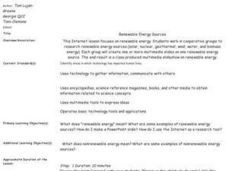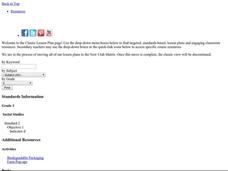Curated OER
Mmmmm, I'm Good! But Am I Good For You?
Students explore the nutritional value of the potato, its role in the food pyramid, and how it can be a part of a balanced diet. In this potato nutrition instructional activity, students read about the nutritional value of potatoes....
Curated OER
Bugs in the Woods
Second graders identify insects and plants in the forest ecosystem in a structured field trip with stations and activity booklets. In this bugs instructional activity, 2nd graders explore the ecosystem of the forest, complete the...
Curated OER
Soybean Science
Fourth graders explore food science by participating in a cooking activity. For this soybean oil lesson, 4th graders listen as the teacher gives them a background on soybeans and their use by humans today. Students grind soybeans and...
Curated OER
Dissecting Owl Pellets
Students examine owl pellets and what their diet consisted of, specifically rodents. This furthers their understanding of simple food chains as well as bone structure and identification.
Curated OER
The Dentist
Students read a short story about visiting a dentist. Then they use toothbrushes in order to demonstrate the correct way to brush teeth. Students use the internet to investigate how some foods are healthier for teeth than others. Then...
Curated OER
In the Wild
Third graders examine the concept of ecology and how animals are suited to their habitats. In this animal adaptation lesson, 3rd graders identify a variety of plants and animal species that live in a Beech forest.Students create a food...
Curated OER
Carbohydrates
In this carbohydrates worksheet, students review the six groups of nutrients needed for the human body. Students focus on sugars and carbohydrates, the sources of these nutrients and how the body uses these nutrients. This worksheet has...
Curated OER
Consuming History
Young scholars research various foods as well as indigenous plants and animals from different historical eras around the world. They use their research to create a design for theme restaurants.
Curated OER
Food Poisoning
Students study the bacteria that cause food poisoning using a written resource. They complete a research worksheet entitled, "America's Most Wanted." Next, they create a short skit about the causes, symptoms, prevention, and other...
Curated OER
Who Ate it First?
Students complete the Seeds of Change worksheet by conducting research on the Seeds of Change website. They list foods native to the Eastern and Western hemispheres, and compile a list of recipes for a meal common after the era of...
Curated OER
The Chesapeake Bay in Captain John Smith's Time
When Captain John Smith visited the Chesapeake Bay in the summer of 1608, what types of animals and habitats did he encounter? Your young historians will analyze primary source documents to answer this question, as well as compare the...
Curated OER
From Milk to Cheese & Seed to Shelf
Learn about food production by making cheese, seeing how a seed gets to a shelf, and discussing food safety. Budding agriculturalists complete several activities and learn about food production, biotechnology, food preservation,...
Curated OER
You Are What You Eat (The 6 Main Nutrients Found in Foods)
Pupils study how carbohydrates, proteins, fats, vitamins, minerals and water provide basic nutrients for body growth and function. They describe quality sources of the basic nutrients and the importance of water.
Curated OER
Nutrients In Our Foods
Students use the Internet to learn of, and research, information on health and nutrition. They study the six essential nutrients and explore the Food Pyramid.
Curated OER
Food Production and Services
Students explore the Family, Career and Community Leaders of America (FCCLA). In this FCCLA lesson, students research and design food-related businesses. Students create business plans and present them to their classmates.
Curated OER
Environment: Renewable Energy Sources
Students, in groups, conduct Internet research on various renewable energy sources. The groups create several multimedia slides for inclusion in a class presentation. Topics covered include solar, nuclear, and geothermal power.
Curated OER
Source Search
Students discuss the sources of items they use everyday. In this social studies instructional activity, students sort pictures of items used everyday by their source. Students participate in a source relay.
Curated OER
Fruit / Vegetable Jigsaw
Students create multimedia projects regarding fruits and vegetables. In this research skills lesson, students use electronic sources to gather information regarding characteristics of several fruits and vegetables. Students then use...
Curated OER
Food For Art-Creating Art With Food Such As Dried Seeds and Pastas
Students brainstorm the many uses of food rather than eating it. Using the internet, they research museums to find pieces of art made out of food. They plan, design and create a dried food centerpiece and present their creation to the...
Curated OER
Primary Sources
Students write personal facts on a photograph of themselves to create a Primary Source. They then define Primary Source and list examples as a class of places where they could find primary sources. They also discuss the importance of...
Curated OER
Food Chain Worksheet
In this food chain activity, students circle organisms that complete food chains shown, 5 total. All chains begin with the sun and move through insects, plant life and animals.
Concordia College Archives
Introduction and Student Inquiry
Introduce young musicians to the history of and different styles of music with an inquiry-based learning activity that asks them to play detectives to determine the similarities and differences among the sheet music found at a series of...
Curated OER
How Safe is that Fresh Autumn Cider?
Corn stalks and pumpkins, caramel apples and cider, falling leaves and brisk nights. There are a few of autumn's favorite things. But how safe is that unpasteurized cider bought at the roadside stand? Young researchers investigate the...
Curated OER
Periodic Table of Fun
Are you looking to put the fun back in the fundamentals of chemistry? Why not have groups create their own periodic tables of something (animals, food, music groups, etc.) practicing the organizational strategies used in the periodic...
Other popular searches
- Food Sources
- Food Origins
- Aboriginal Food Sources
- Esl Food Sources
- Food Origins Of
- Science Sources of Food

























